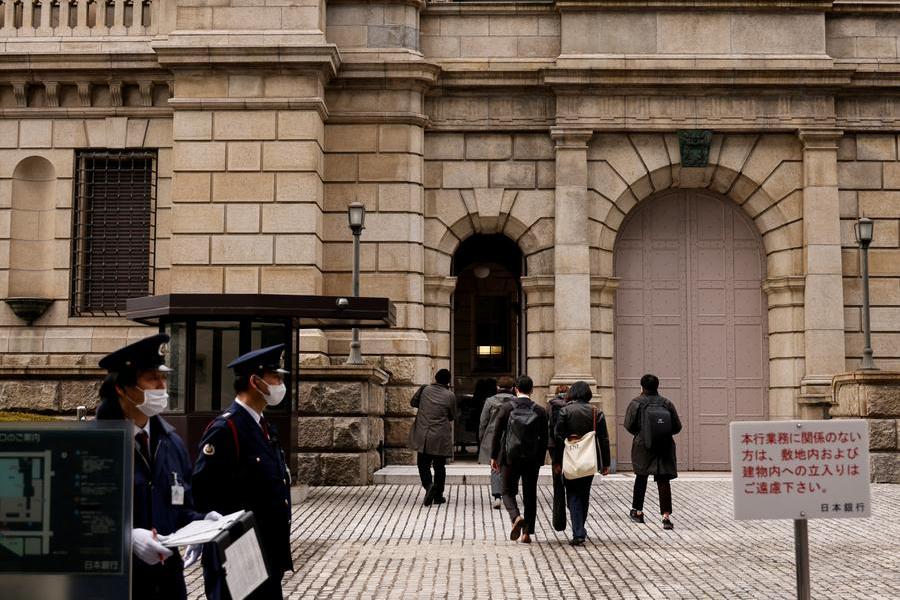Economy
Trauma of Japan’s deflation battle keeps BOJ wary of policy shift

Japan’s bitter memories of its decades-long battle with deflation hang heavily over the central bank’s deliberations to take its first modest step away from ultra-loose monetary policy, even as inflation and wages creep up.
The appointment of Kazuo Ueda as Bank of Japan (BOJ) governor this year and mounting price pressures have fired up market chatter that the new chief might hasten an exit from the bold stimulus of his predecessor Haruhiko Kuroda.
But uncertainty over the wage outlook and emerging global economic weakness heighten the chance the BOJ will hold off tweaking its controversial yield curve control (YCC) policy at least until autumn, say three sources familiar with its thinking.
“In a country that has seen interest rates stay ultra-low for two decades, the shock of the BOJ’s first move could be enormous,” said one of the sources. “That’s enough to make the BOJ cautious.”
Japan has not seen interest rates rise since 2007, when the BOJ hiked short-term rates to 0.5% from 0.25% in a move later criticised for delaying an end to price stagnation.
Having taken part in Japan’s battle with deflation as BOJ board member from 1998 to 2005, Ueda knows all too well the danger of a premature exit from ultra-loose policy.
Wary of a wobbly recovery, he opposed the BOJ’s decision in 2000 to raise short-term rates to 0.25% from zero.
The bank drew significant political heat for that tightening and was forced to reverse course just eight months later and adopt quantitative easing.
Given the trauma of such ill-timed policy shifts, caution will be Ueda’s priority, the sources say, suggesting an end to YCC, which caps the 10-year bond yield around zero, could be some time away. That would mean more significant policy changes are even further down the track.
“Tweaking the yield cap alone may not do much harm to the economy, as long as short-term rates are kept low,” one of the sources said. “But the BOJ’s long, historical struggle with deflation can’t be taken lightly.”
SHIFTING PRIORITIES
One key difference between the BOJ’s and the market’s thinking lies in Japan’s inflation outlook. On the surface, conditions for phasing out a portion of the BOJ’s massive stimulus appear to be falling in shape.
Core consumer inflation hit 3.4% in April, holding above the BOJ’s 2% target for over an year, as companies continued to hike prices for a broad range of goods and services. Companies offered pay hikes not seen in three decades in this year’s wage talks with unions, heightening hope of a sustained rise in pay after decades of stagnant wage growth.
With robust domestic demand offsetting some of the external headwinds, the BOJ is widely expected to raise this year’s inflation forecasts at its next quarterly review in July.
But inflation is now less of a trigger for an exit than it was in the past, as policymakers focus on risks that could again upend the path toward a sustained recovery.
“If you know the U.S. economy could slow sharply due to aggressive rate hikes in the past, it’s natural for the BOJ to be cautious about phasing out stimulus,” a third source said.
Weakness in China, a major market for Japanese manufacturers, also casts doubt over whether companies can reap enough profits to sustain wage hikes next year.
To be sure, Ueda has left scope to tweak YCC in case inflation continues to overshoot the BOJ’s forecasts. At his debut policy meeting in April, he removed guidance pledging to keep rates at “current or lower levels.”
In a group interview last month, Ueda said the BOJ could tweak YCC “if the balance between the benefit and cost of our policy shifts.”
With Kuroda’s massive stimulus having failed to re-anchor inflation expectations around the BOJ’s target, however, Ueda has good reason to be cautious.
Ueda last month said eradicating Japan’s entrenched deflationary mindset remained a difficult challenge and warned moving too quickly on rates was more dangerous than not moving fast enough.
“The cost of waiting for underlying inflation to rise until it can be judged that 2% inflation has fully taken hold is not as large as the cost of making hasty policy changes,” he said.
Economy
Russian central bank says it needs months to make sure CPI falling before rate cuts -RBC


© Reuters. Russian Central Bank Governor Elvira Nabiullina attends a news conference in Moscow, Russia June 14, 2019. REUTERS/Shamil Zhumatov/File Photo
MOSCOW (Reuters) – Russia’s central bank will need two to three months to make sure that inflation is steadily declining before taking any decision on interest rate cuts, the bank’s governor Elvira Nabiullina told RBC media on Sunday.
The central bank raised its key interest rate by 100 basis points to 16% earlier in December, hiking for the fifth consecutive meeting in response to stubborn inflation, and suggested that its tightening cycle was nearly over.
Nabiullina said it was not yet clear when exactly the regulator would start cutting rates, however.
“We really need to make sure that inflation is steadily decreasing, that these are not one-off factors that can affect the rate of price growth in a particular month,” she said.
Nabiullina said the bank was taking into account a wide range of indicators but primarily those that “characterize the stability of inflation”.
“This will take two or three months or more – it depends on how much the wide range of indicators that characterize sustainable inflation declines,” she said.
The bank will next convene to set its benchmark rate on Feb. 16.
The governor also said the bank should have started monetary policy tightening earlier than in July, when it embarked on the rate-hiking cycle.
Economy
China identifies second set of projects in $140 billion spending plan


© Reuters. FILE PHOTO: Workers walk past an under-construction area with completed office towers in the background, in Shenzhen’s Qianhai new district, Guangdong province, China August 25, 2023. REUTERS/David Kirton/File Photo
SHANGHAI (Reuters) – China’s top planning body said on Saturday it had identified a second batch of public investment projects, including flood control and disaster relief programmes, under a bond issuance and investment plan announced in October to boost the economy.
With the latest tranche, China has now earmarked more than 800 billion yuan of its 1 trillion yuan ($140 billion) in additional government bond issuance in the fourth quarter, as it focuses on fiscal steps to shore up the flagging economy.
The National Development and Reform Commission (NDRC) said in a statement on Saturday it had identified 9,600 projects with planned investment of more than 560 billion yuan.
China’s economy, the world’s second largest, is struggling to regain its footing post-COVID-19 as policymakers grapple with tepid consumer demand, weak exports, falling foreign investment and a deepening real estate crisis.
The 1 trillion yuan in additional bond issuance will widen China’s 2023 budget deficit ratio to around 3.8 percent from 3 percent, the state-run Xinhua news agency has said.
“Construction of the projects will improve China’s flood control system, emergency response mechanism and disaster relief capabilities, and better protect people’s lives and property, so it is very significant,” the NDRC said.
The agency said it will coordinate with other government bodies to make sure that funds are allocated speedily for investment and that high standards of quality are maintained in project construction.
($1 = 7.1315 renminbi)
Economy
Russian central bank says it needs months to make sure CPI falling before rate cuts -RBC


© Reuters. Russian Central Bank Governor Elvira Nabiullina attends a news conference in Moscow, Russia June 14, 2019. REUTERS/Shamil Zhumatov/File Photo
MOSCOW (Reuters) – Russia’s central bank will need two to three months to make sure that inflation is steadily declining before taking any decision on interest rate cuts, the bank’s governor Elvira Nabiullina told RBC media on Sunday.
The central bank raised its key interest rate by 100 basis points to 16% earlier in December, hiking for the fifth consecutive meeting in response to stubborn inflation, and suggested that its tightening cycle was nearly over.
Nabiullina said it was not yet clear when exactly the regulator would start cutting rates, however.
“We really need to make sure that inflation is steadily decreasing, that these are not one-off factors that can affect the rate of price growth in a particular month,” she said.
Nabiullina said the bank was taking into account a wide range of indicators but primarily those that “characterize the stability of inflation”.
“This will take two or three months or more – it depends on how much the wide range of indicators that characterize sustainable inflation declines,” she said.
The bank will next convene to set its benchmark rate on Feb. 16.
The governor also said the bank should have started monetary policy tightening earlier than in July, when it embarked on the rate-hiking cycle.

 Forex3 years ago
Forex3 years agoForex Today: the dollar is gaining strength amid gloomy sentiment at the start of the Fed’s week

 Forex3 years ago
Forex3 years agoUnbiased review of Pocket Option broker

 Forex3 years ago
Forex3 years agoDollar to pound sterling exchange rate today: Pound plummeted to its lowest since 1985

 Forex3 years ago
Forex3 years agoHow is the Australian dollar doing today?

 Cryptocurrency3 years ago
Cryptocurrency3 years agoWhat happened in the crypto market – current events today

 World3 years ago
World3 years agoWhy are modern video games an art form?

 Commodities3 years ago
Commodities3 years agoCopper continues to fall in price on expectations of lower demand in China

 Economy3 years ago
Economy3 years agoCrude oil tankers double in price due to EU anti-Russian sanctions























